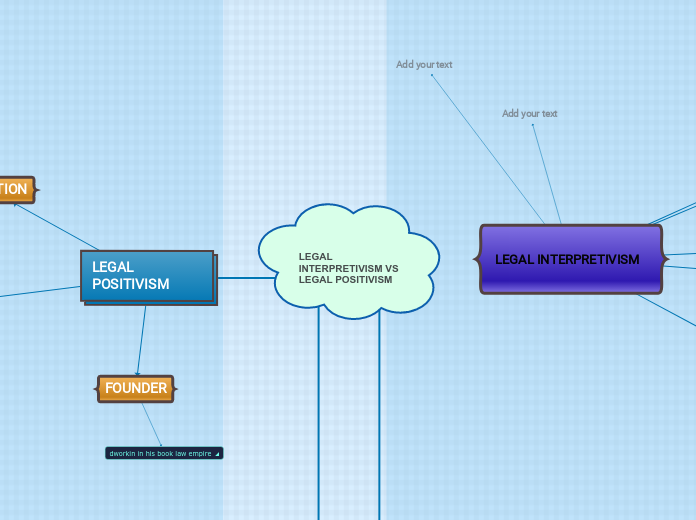
Add your text
Add your text
Add your text
Add your text
Add your text
Add your text
Add your text
Add your text
FEATURES
BASIS
MAIN IDEA^
law is
not inherent in nature
of pre-interpretive identification
what lawyers aim to construct in their practice
no division between law and morality
MAIN CONTRIBUTORS
, interpretivism includes even the theses of
osef Esser,
Theodor Viehweg,
Chaim Perelman,
Wolfgang Fikentscher,
ntónio Castanheira Neves
Friedrich Müller,
Aulis Aarnio,
Add your text
CASE EXAMPLE
Riggs v. Palmer
ADVANTAGES
show indispensability of theoretical ascent.
satisfies two standards of “clarity and system”
better justice to the reflective nature of legal reasoning
subjective views, emotions, opinions and values of the people ARE TAKEN INTO CONSIDERATION
Enables understanding
flexible
DRAWBACK
RESEARCH METHOD
QUALITATIVE
ethnographic studies
unstructured interviews
participant observations
focus groups.
CHARACTERISTICS
FOUNDER
dworkin in his book law empire author^
DEFINITION
more than rules to law,
moral principles guide the law
Add your text
Add your text
Add your text
Add your text
Add your text
Add your text
Add your text
Add your text
BASIS
Positivism -based on the concepts of rules
. Power is
main basis-validities the law
main working purpose of the law.
created -figure in authority
imposition of sanctions
concept of power is centralised
MAIN IDEA
stablish A STUDY OF NATURE OF LAW DISENTAGLED WITH HOW
CASE EXAMPLE
ADVANTAGES^
CLEAR AND UNBIASED EXPLANATION^
In a culturally plural society like india,
legal positivism is important because morality is a subjective term differs from one culture to another
, the separation of law and morality
one the feature of positivism.
legal positivism is important
Hold the integrity and unity of a DVERSIFIE country
character of positivism becomes relevant in India,
with positivism the law which is established is accepted as it is without any moral qualification.
as for different group’s “what ought to be law” differs from another. .
MAIN CONTRIBUTORS
Jeremy Bentham
John Austin
Kelsen
Fuller
DRAWBACKS
RIGID
NOT EASY TO CHALLENGE AND CHANGE LAWS
fails to give morality its due.
nability to accurately prove hypotheses through empirical experiments
RESEARCH METHOD
QUANTITIAVE RESEARCH
structured questionnaires,
statistics,
numerical data
surveys
methods - reliable and accurate.
CHARACTERISTICS
Separability Thesis .
shares features with morality .
does not depend upon morality for its justification
Pedigree Thesis.
2. Law is a social invention.
Various methods in determination social authority
social facts establish what qualifies as law.
3.existence thesis,
3 law presupposes its effectiveness
roots -political philosophies of Hobbes and Hume,
important architects of contemporary legal positivism
Austrian jurist- Hans Kelsen
two dominating figures in analytic philosophy of law,
H.L.A. Hart (1907–92)
Joseph Raz,
first elaboration - Jeremy Bentham
existence and content of law depends on social facts
depends not on its merits
Emphasizes conventional nature of law
Add your text
Michigan v. Johnson^
laws of Nazi Germany
orally unfair
legally legitimate